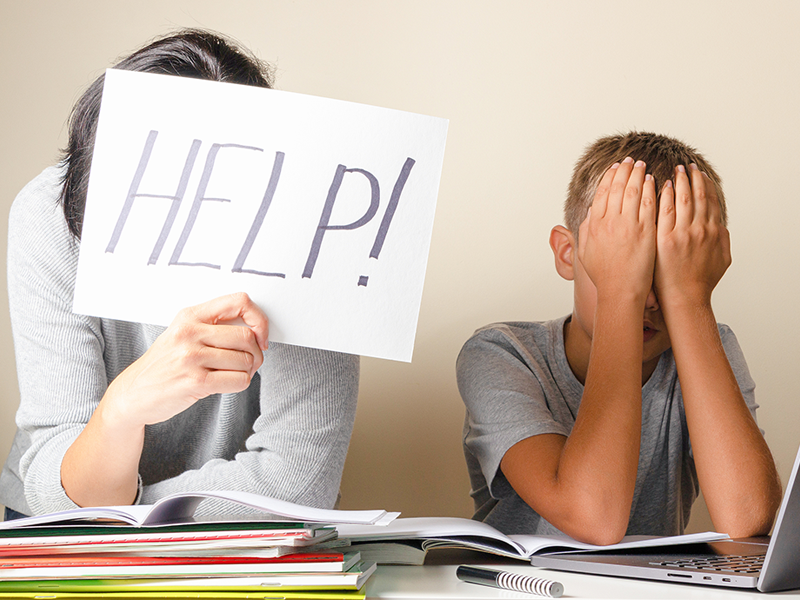Pandemic parenting is not easy.
He won’t focus. She won’t stay still. He’s not motivated to do his schoolwork. She’s watching videos on YouTube rather than paying attention to the teacher’s lessons.
These are just a few of the concerns I hear from parents about virtual school. Even a year into the pandemic, children and adolescents continue to struggle with learning, motivation and focus while forced to be glued to a computer screen for eight hours a day. Although some students are returning to the classroom to complete the remainder of the 2020-21 academic year, many are remaining at home, squirreled away at the kitchen table or their bedroom, logging on to hours of virtual school.
What can parents do to help?
First, realize that learning from home is akin to taking your child to the candy store and saying, “Eat your vegetables!” What I mean by that is the home is usually a comforting, calm, peaceful place, where children can relax and do what they enjoy, whereas school is more structured and rigid. Now instead, due to the COVID-19 pandemic children are being forced to accept the sacred space we call home – the candy store – as a place where they need to focus on their work and follow schedules and routines – the vegetables. That is unfair!
Parents should acknowledge this reality and give children some grace during this period of major transition. Adults, in general, are better able to adjust to new schedules and routines. We can’t, however, expect children to adjust as easily. (And it’s been tough for plenty of adults too!) Remember, our lives changed dramatically last spring; even a year into the pandemic, many are still struggling to adjust. However, children thrive on structure. You should anticipate setbacks. Allow for those setbacks and acknowledge how difficult it is for all of you. That grace under pressure will rub off on your children and give them courage to persevere.
Although we are well into the school year, it’s not a bad idea to take a fresh look at your child’s learning environment. Try to avoid having children and adolescents participate in virtual school from their bedrooms, where they are surrounded by things they love and that trigger “relaxation mode.” Instead, find a dedicated place in your home for learning so children know when they are in that space, they are expected to do schoolwork. Make sure any needed supplies are nearby. With limits on distractions, children will be better able to focus and succeed academically.
I also urge families to stick to a schedule. Maintain a consistent wake-up time. Children should eat breakfast every morning and get dressed before logging on. This puts them in the right mindset for the school day. And going to sleep at the same time every night is important; the brain can better focus if it is well rested and well nourished.
Ensure children take breaks throughout the day and try to make them meaningful. No one can sit in front of a computer for eight hours and maintain focus. Your child’s teacher probably has breaks scheduled throughout the day. Children should use that time to get a snack or go to the bathroom. If the break is long enough, a few minutes of fresh air can go a long way to re-energize their minds.
Positive Reinforcement
Positive reinforcement during this time is vital. When talking with your child about virtual learning, acknowledge that it is frustrating. Then encourage and motivate your child. Let them know that you believe in their abilities and appreciate their efforts. Make plans to reward them for completing work such as taking a walk, cooking/baking a treat or playing a game together. Some children will want to bargain with you. If so, consider allowing them to start a fun activity and then transitioning to schoolwork with the promise to return to that fun activity once the work is done. We all like incentives. Creativity during these times is key!
Remember, when children were in the school building, they likely received encouragement and recognition from their teachers. For younger children, that might have been an opportunity to pick a prize from a treasure chest or get a sticker for a job well done. For older kids, that might have been an award in front of their peers. Replicate these motivators at home – and if you need tips, reach out to your child’s teacher to see what worked for them.
One of the most important things parents can do to help their children through this unprecedented time is to have their children engage in safe, social activities to remain connected with their friends. That might mean a FaceTime call or a Zoom game night. With the nicer weather, that could mean a masked, physically distanced walk around the neighborhood or bike ride with a friend.
Parents should always be on the lookout for signs of a serious problem. If you notice your children have significant changes in mood, sadness, irritability, worry or a shift in sleep patterns or appetite, consult your pediatrician. Also, seek immediate help if your child has mentioned feelings of worthlessness, hopelessness or not wanting to live.
Though we are in the home stretch of the school year, it’s not too late to make changes that may help your children succeed in these final weeks and potentially prepare them for the upcoming school year.
Related:
How to Stay Sane While Working and Schooling at Home
Make a Plan for Pandemic Parenting During the Coronavirus


